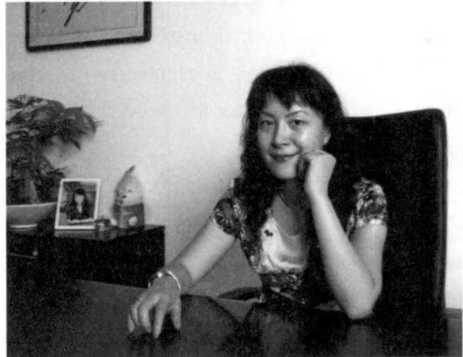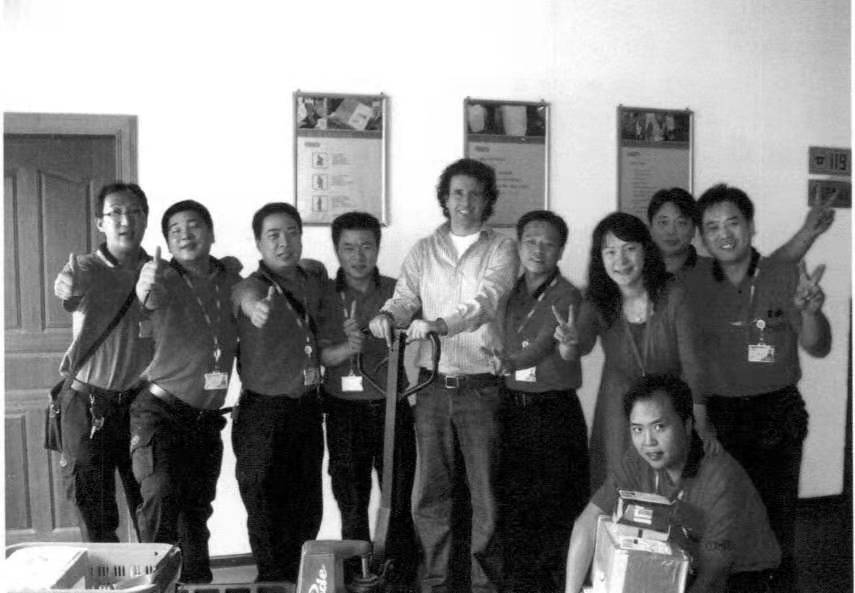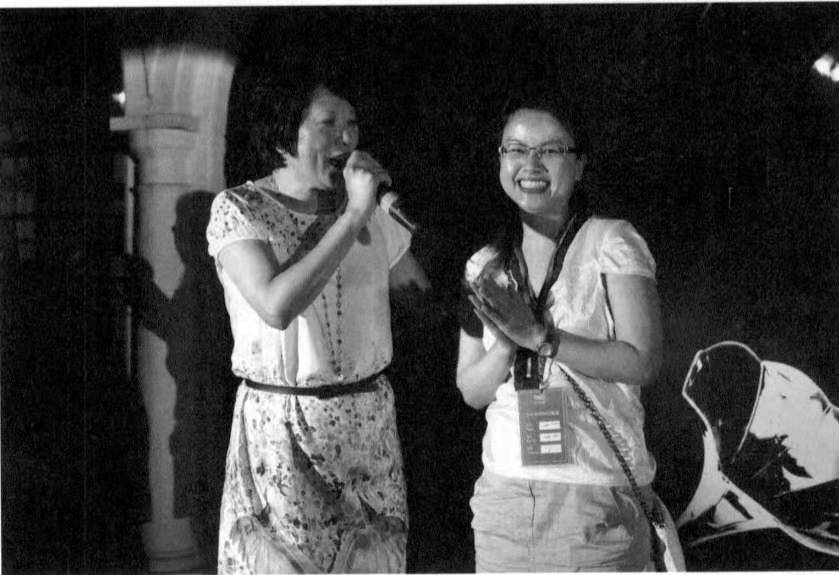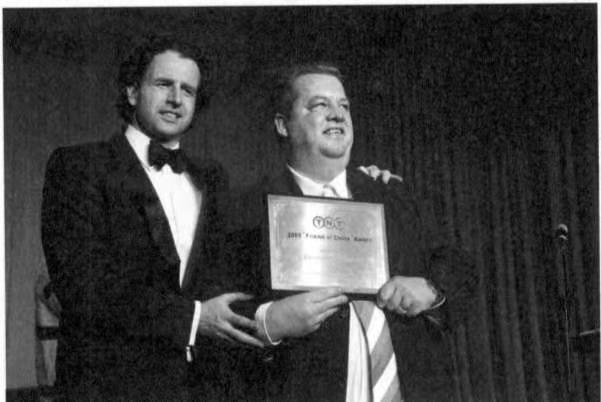
The first time I met Maggie she was not, as they say,‘on top of her game.’I had come to Wuhan (a large city located right in the middle of China), her hometown, on the day before a visit from Peter Bakker (our CEO). I expected to find an excited team eager to orchestrate the events Peter would attend. Instead, I found myself surrounded by a group of people who spent the entire evening complaining; Maggie led the way.
The complaints centered on the fact that the parcels their customers sent to Wuhan did not receive the necessary care and attention from TNT colleagues in Shanghai (our central collection and distribution hub) or in other parts of the world. The poor service had recently led to a number of complaints from customers, and therefore this explained the Wuhan depot’s mediocre performance.
They seemed very disinterested in Peter Bakker’s imminent arrival and even less concerned about the reason for his visit: to officially launch China’s first electric delivery van. We had worked diligently on that project for quite some time, and Dong Feng, a large car manufacturer in Wuhan, had agreed to build a prototype.
After Peter’s visit, I suggested Maggie come to Shanghai to meet her colleagues at the airport and discuss their customer service challenges. A few weeks later, she took me up on my offer. In addition to arranging Maggie’s visit to Shanghai, I also discussed the situation with Will Zhao, who I had promoted to West Regional General Manager in 2008. I explained to him that in my view, Maggie blamed all sorts of external factors for the troubles she faced in her depot. However, on average at least, every depot received the same service from their colleagues in Shanghai and overseas. While many depot leaders just accepted inevitable communication glitches, patiently working within their sphere of influence to correct them, Maggie turned negative, blaming the world beyond her control for her troubles.
Will agreed to work closely with Maggie in the following months. Her visit to Shanghai revealed that a lot of the things she had complained about were not entirely outside her control. Many operational problems could be solved if Wuhan depot kept in much closer contact with their colleagues in Shanghai.
Not long after this, I heard from Will that Maggie had‘turned a corner.’I saw her a few times in Shanghai at events like the annual dinner, surrounded by lots of people, and indeed she looked a lot more cheerful. But I did not return to Wuhan until the Culture Trip of 2009.
We arrived on the train from Zhengzhou to visit the Wuhan depot. As I described in the chapter on Max Sun, on the previous day the Zhengzhou depot had conducted a marvelous welcome for us. Compared to that experience, I did not expect much from our Wuhan visit.
We arrived at the Wuhan depot in the morning. Surrounded by used car garages, that depot must have had the worst location of any of TNT’s depots in China; stray dogs lurked everywhere.
In stark contrast to these bleak surroundings, inside the depot we encountered a group of people radiating positive energy-quite a transformation from what I had experienced just over a year earlier. Everyone was cheerful, the depot looked colorful and clean, and the whole team had obviously been eagerly anticipating our arrival.
A nice show full of songs, plays, stories, and friendly gestures packed the next two hours. I could clearly see that these people were really performing for each other, not for us. In the middle of all the wonderful activities shone Maggie. She was smiling from ear to ear, and the way she carried herself clearly showed that she was the‘prima inter pares’(‘first among equals’) of her team-not a typical boss at all. In the following months, Wuhan depot really began moving up in both TNT’s customer satisfaction and employee engagement rankings.
Following our visit to the Wuhan depot, I spoke much more frequently with Maggie. I learned that the time we first met was the one negative episode in her otherwise happy life. Born in 1976, she had grown up in Wuhan, the youngest child of parents also born and raised in Wuhan. Her parents were both engineers, and her father worked in the military when she was young.

Maggie, Iman and the Wuhan team during the Culture Trip visit
Maggie enjoys happy memories of her childhood years, when life-in her own words-was‘simple and basic.’Her family had enough to eat, and she spent her days playing on the riverbanks with her younger brother. That sense of‘keeping things simple’ still strongly influences her. Maggie views herself as an‘ordinary person,’and she has no intention of ever leaving Wuhan. She hopes that life will be simple and happy for her child as well, so as far as possible, she shields him from the pressures of China’s currently very competitive environment.
An excellent student, Maggie accepted her first job at Proctor & Gamble in 1997 after graduating from university with a degree in business. Her salary of 1200 RMB (about 180 USD in today's exchange rates) per month was a great salary to earn in those days.
Maggie joined TNT in 1999, initially with the Logistics division, which had some operations in Wuhan. Two years after joining she became Branch General Manager, and she remained in that role after switching to the Express division in 2006.
When we had a chance to discuss the challenges she faced when I first met her, Maggie confessed that during that time she had lost her sense of optimism. She also explained that there was no one single event that changed her or her team. Rather, the positive attention they gave to each other combined with all the other small things they accomplished made their‘picture look bright again.’In the end, their success resulted from changing their attitude.
Maggie’s story and personality in many ways embodies what I experienced more broadly while with TNT. Talented, yet humble people shared their sparkling personalities with other people, together creating an environment that at some point became magical. Teams of people actually progressed beyond being merely engaged to be touched emotionally.
It truly meant a great deal to me personally to meet and learn from someone like Maggie. Her infectious happiness, humble upbringing; simple, yet delightful view of the world; and ability to touch other people’s souls all impressed me deeply.
‘TOUCHING PEOPLE’ AS A MISSION
I mentioned earlier that my team included the goal of‘Touching People’ in our mission. A bit more background will highlight the importance of its inclusion. Michael had introduced me to a professional coach, Alan Watkins, from the UK. Initially, I began working with Alan on my own personal development, but soon he also began helping my team.
In our first team workshop with Alan, he challenged our team’s mission. I was convinced that the mission of the organization,‘Creating a great place to work and a great company to do business with’,should also be my team’s mission. Alan ignored my concern and invited the team to gain more clarity about what they wanted to achieve together. I felt uncomfortable, but accepted Alan’s somewhat open-ended process.
Now, a few years later with the benefit of hindsight, I am happy I did. I learned I could simply‘let things go’ and see how events naturally transpired; usually great things happened that I could not have predicted. In this case, we discussed at length what our team was really all about, what motivated us personally, and how we could have the most impact on the organization. We wanted to be inspirational yet practical. We settled on.
Touching People
Moving Goods
Connecting China to the World
I still love this mission. The first and last goals are so inspiring, almost transcendent, yet the middle item remains grounded, very much‘down to earth.’These three simple phrases provided personal meaning for individual team members as well as for the team collectively. Simply developing a separate mission for my own team was such a great idea as well. Our mission would not have been appropriate for the larger China organization, because it would have been unclear to that larger audience not fluent in English. The process also encouraged members of my team to create mission statements with their teams. Some of them indeed did just that.
Later, when we worked with Dave Logan, he explained that allowing various ‘tribes’ to have their own mission and even their own values is a good idea, because any organization is always a collection of tribes, and thus overall unity is impossible to achieve. As long as the various missions do not contradict each other and are not by nature destructive, letting different‘tribes’ determine their own‘rules of engagement’ and define their own future avoids many more problems than it causes. Additionally, people believe in what they create together.
So how can you touch the people in China? That question has a simple answer-just like you touch anyone, anywhere around the globe. The same kinds of events and circumstances that make people happy or sad anywhere naturally evoke similar emotions from Chinese people. Over the past five years in China, I have witnessed many tears of joy and amazement, of pride and affection. I have learned that behind an‘outer layer’ of self-protection, the Chinese are deeply and openly emotional. Once we arrived and began working closely with them, the few of us Westerners also discovered and displayed a much more emotional side of our‘business personalities.’
Let me share a few things we did to give meaning to the elements of‘Touching People’ and‘Connecting China to the World.’
“NEVER SAVE ON THE FLOWER BUDGET”
I first encountered this wonderful bit of advice in Tom Peters’ outstanding book, ‘the Little Big Things.’It should itself be the title of a book! Since then I have shared that recommendation more often than I have actually sent flowers, but we did send a lot of flowers and gave many other‘small attentions’ to our staff.
Probably the most important event on a large scale that involved sending flowers occurred in 2010 when we received the results from the employee engagement survey. TNT conducts this survey every year, but had skipped 2009 in an effort by the head office to cut costs (not everyone in TNT understood the need to keep staff engaged during a recession!).
In this case, overall satisfaction was 82 on a scale from 0 to 100. We had scored the same back in 2008, which was a bit of a disappointment to some; however, I interpreted these results differently. In 2008, we had endured a financial crisis, yet due to the many plans implemented to improve their lives, people had expressed hope in the future. Thus, their high scores in 2008 reflected that hope, while by 2010, they liked what had become real.
Based on my optimistic interpretation, Helena and I agreed we would send flowers to every depot in the country that had scored 80 or above. Everyone received these flowers on the same day, together with a letter of appreciation. What an impact our gesture had! We received‘thank-you’ notes from around the country (some 30 of the 34 branches had scored that high). Some of these responses also expressed surprise. Because their score had dropped compared to 2008, they anticipated having to explain why. But in our view, any score above 80 was worth celebrating.
‘TOUCHING PEOPLE’ DINNER
If the mission of‘Touching People’ can be compared to mountaineering, then we reached the peak when we organized a Touching People dinner. In the summer of 2010 Peter Bakker planned to visit Shanghai for a couple days in connection with the Shanghai Expo. For similar visits in the past, we had spent a lot of time and energy trying to decide what board members might want to do or see. This time, I suggested we reverse our emphasis on board-member interests and instead find a way to inspire our people with Peter’s visit. Also, these events usually involved only the local leadership teams-because otherwise, they rarely got any exposure to board members, and careers could be made or broken in one dinner with the board.
I knew Peter, a deeply spiritual man, would graciously accept almost anything as long as it was original and personal. I proposed to my team that we host a‘Touching People’ dinner. We would all invite three people to attend who had touched our souls in one way or another. That evening, we would share with each of our guests why s/he had been invited. We planned to get a number of them on stage to share their stories with the entire audience. The team was reluctant at first, but they told me they wanted to proceed, so we agreed on who would organize the event.
The evening of the dinner was steaming hot, and we had prepared in the backyard of an old villa in the French Concession. When Peter arrived with a few other people I knew well from the head office, we first asked him to practice a Chinese drum performance that my team had done previously. All guests arrived and everyone was slightly nervous, because we had not explained to our guests why they specifically had been invited. We welcomed everyone and then explained the purpose of the dinner.
All that transpired next will probably remain with me for the rest of my life. One after another, my team members came to the stage and shared stories of how they had been touched by the people they had invited. If I had worried a bit whether my idea for the dinner would be clearly understood, I needn’t have. My team had developed my suggestion beyond what I could have imagined. Someone on my team had even visited one person’s family and videotaped them explaining why their daughter, a supervisor in one of our contact centers, was such a special person. She traveled three hours each day, back and forth to work, but always with a smile on her face.

Cecillia praises her team member during the‘Touching People’dinner
Richard Lee, the Beijing Branch General Manager who spoke on behalf of Andrew Yang who was unable to attend, shared a story about one of his truck drivers; he actually shed tears on stage while he told the story. I could never have dreamed of such a moving experience.
I had invited Alex, Max and Maggie as the people who had touched my heart. I shared the story of Maggie’s amazing ‘positivity’, and I also took the chance to publicly thank Linda for everything she had meant to me and my family. Toward the end, Peter even went on stage, and in addition to sharing his amazement about the evening, he thanked Peter van Laarhoven, his strategy director for many years who was leaving TNT later that month, for everything he had done for him.
We were all deeply satisfied to be able to host such a dinner. Actually, it was just an idea that cost little and didn't take much time. I did not control much of the program, and although I had worried a little about that, my team managed to broaden my vision for the evening far beyond what I could ever have imagined. Through touching their guests, they touched me as well.
FRIENDS OF CHINA
Soon after he arrived and prior to our defining our mission to‘Touch People’ and ‘Connect China to the World,’Michael started an initiative that blended very nicely with those goals, called choosing‘Friends of China.’Michael was acutely aware that TNT’s China organization had gradually drifted away from the rest of the company for various reasons. In fact, all leaders outside China had experienced many difficulties trying to communicate regularly and effectively with colleagues in China. Michael also realized that we could not turn TNT’s business in China around unless we solicited the help of our colleagues overseas. To enlist their help, we needed to find a way to get them interested in China. Michael launched the idea of nominating people outside China who had been particularly helpful, to receive the title,‘Friend of China.’
Michael’s idea worked wonderfully. In the years following, we refined the process for receiving this award, until eventually, many people began actively trying to win. Every year the management team would nominate various people, and during the ensuing discussion, everyone had the chance to defend their choices. The challenge often boiled down to whether people had been nominated simply because we liked them rather than for what they had actually achieved. These conversations proved to be enlightening, because they reminded us just how many people in TNT’s wider network were valuable for us. In 2010 we had more than 30 nominations. No one could nominate someone in the organizational layer above them; this prevented the award from becoming a‘boss-pleasing’ exercise. After voting we usually gave the Friend of China award to only three or four people.
We invited these winners to our annual conference in China at the start of the New Year. We would send them invitation letters explaining that every year we invited some of our colleagues abroad to attend our conference to build stronger relationships. We indeed invited several other people, so recipients never knew ahead of time that they won the award.
At the gala dinner, after we had handed out awards for the winning depots and regions in China, we announced the winners. They each came onstage to receive their awards. I remember these moments as some of the best from my time in China. Invariably, the recipients had contributed something extra-extra effort, selflessness, a willingness to do more than their job required. That experience, when they stood center-stage in front of a few hundred Chinese people demonstrating how much they were valued, was deeply moving for everyone.
One year we awarded the prize to two Dutchmen-Mike Peeze, supervisor from Amsterdam gateway, and Everhard Beekman, who ran our road hub operations in Arnhem. They flew in through Hong Kong on our own 747 aircraft, which provided an incredible experience for them already. Everhard in particular was deeply grateful for the award. A kind man, with TNT for 25 years, he stood on stage crying his eyes out. I realized this may have been one of the very few times (if not the only time) in his career that someone put him on stage to thank him for all his loyalty and hard work.

Friend of China Everhard Beekman with Iman
These‘Friends of China’ became some of our best ambassadors throughout TNT of the special atmosphere we had created in China-an additional benefit from the awards. For example, Everhard displayed a lot of pictures of the Chinese people in the road hub in Arnhem in the Netherlands.
FRIENDS WITH GAM
TNT China had always had troubled relationships with Global Account Management(GAM). The GAM teams within TNT operate as virtual teams and have responsibility for the top 75 accounts in the company. They have to excel at building relationships with people throughout our matrix organization, because even though they do not have profit-and-loss responsibility for any internal entities, they still make decisions that tremendously impact those entities. Many country management teams love to complain about the‘GAM crowd’(and vice versa).
Our first year in China, we also had some tough, serious debates with the GAM community; we accused them of not listening to us or thinking clearly, and of being more on the customer’s side than ours. They accused us of being selfish. After much discussion over time, we were able to settle many of our differences. We agreed on‘rules of engagement,’ and Willem Prinsen, the head of GAM, and I personally committed to uphold them.
After our mutual agreement, we experienced several real successes, and we stopped blaming each other when things did not work out as planned. Willem and I both had to intervene on a number of occasions when our people violated the rules we had agreed on. I started to appreciate a number of the GAM people as some of the best in the entire organization. Over the years, several of them became official‘Friends of China.’ reinforcing our growing trust. When I left TNT, GAM awarded me the title, ‘Friend of GAM,’which they specifically invented for me; I was touched.
HOSTING OVERSEAS VISITORS
Working in China for a multinational firm like TNT often seems like running a tourist agency for corporate tourists. Many executives in other companies have expressed similar sentiments. Everyone holds high expectations of China. They love to visit Shanghai, and after a nice dinner on the Bund, head office visitors often went home with the impression that life in Shanghai is easy and exciting-leaving many of us with the task of making their high expectations a reality. Certainly after the financial crisis began, this pressure only increased. Even before the crisis, TNT’s head office viewed China as holding promise for the future; in simplified terms, “If you cannot make a profit, then at least gain market share.” But definitely after the crisis, the China operations of many companies had to deliver profit, and lots of it.
For a while, I did exactly what executives of other companies told me they were doing-I tried to keep the visits of leaders from TNT’s head office short, make sure they did not get too much entertainment, and tried to convince them that our task was harder than it looked.
However, my‘visitor strategy’ changed dramatically once we clarified our mission. We began to focus on making every visit as memorable as possible in an effort to build a base of loyal support. We proclaimed that every person who made the effort to come to China should leave not only inspired, but preferably in tears. My team went out of their way to make people feel at home; we orchestrated well-organized site visits that always inspired our local teams as well, and also included some tourist activities. The year of China’s World Expo was of course the easiest in which to host visitors; we would give them entrance tickets to the Expo and arrange VIP entrances to some of the most popular pavilions.
We managed to create many valuable human connections with these efforts, At the end of their two-week visit, even the internal audit team-who of course we could not entertain the same way we did other groups-remarked that they had never before felt so welcome. Once when I was at TNT's headquarters in Amsterdam, someone from there-who was in Shanghai at the time-shared on a conference call with Peter Bakker that he could“feel the positive culture dripping off the walls.”
BEYOND ‘POSITIVITY’
I really believe our mission of‘Touching People’ and‘Connecting China to the World’ actually exceeded the mere creation of a positive culture. We tried to forge truly human connections, and whenever we succeeded, we created magic. Readers may mock the use of‘magic’ as childish fantasy, but I and many others enjoyed several experiences well described as‘magic.’And special, ordinary people like Maggie Han, from Wuhan, created that magic.
(selected from ln China We Trust by lman Stratenus, published by China Intercontinentalo Press in 2018)

